Honest, paywall-free news is rare. Please support our boldly independent journalism with a donation of any size.
The Supreme Court ruled along ideological lines on Friday to overturn a 40-year-old doctrine known as Chevron deference in a seismic decision that could see a major erosion of federal administrative rule in issues of public health, labor rights, environmental protection, food safety, and more.
The Court ruled 6 to 3 in a pair of decisions that hands a massive amount of control over federal regulatory powers to the courts, overturning the doctrine that allowed federal agencies to have interpretive authority when there was any ambiguity in a law. Chevron deference allowed experts at federal agencies — as people better situated to make decisions on issues within their regulatory purview — to interpret statutes rather than judges.
The decision is a major win for conservative judicial activists and corporations that have long sought to overturn the Chevron deference. It will have reverberating effects for decades, as corporations and special interest groups can challenge a wide range of regulations aimed at protecting the public from cancer-causing pollution, violations against workers, consumer abuse, or anything else.
In his decision, Chief Justice John Roberts disagreed that experts within agencies are more knowledgeable than judges and the courts. “Perhaps most fundamentally, Chevron’s presumption is misguided because agencies have no special competence in resolving statutory ambiguities. Courts do,” Roberts wrote.
Roberts appeared to outright acknowledge that the upholding of Chevron deference was tantamount to curbing judicial power, writing that the Court had to overturn it because it has “become an impediment” to courts’ decision-making power over laws. This comes at a time when the extreme far right Supreme Court is already granting an unprecedented amount of power to the conservative-dominated judiciary.
Chevron deference, established in the 1984 Supreme Court decision in Chevron v. Natural Resources Defense Council, has been a hallmark of judicial decision making for decades. Chevron is one of the most-cited decisions in federal courts.
In Justice Elena Kagan’s dissent, which was joined by Justices Sonia Sotomayor and Ketanji Brown Jackson, she writes that the majority has made a “laughing-stock” of the legal principle that courts rule by following precedent, or stare decisis, in its destruction of the Chevron doctrine’s “judicial humility.” In effect, the majority “turns itself into the country’s administrative czar,” she wrote.
The majority’s “justification comes down, in the end, to this: Courts must have more say over regulation — over the provision of health care, the protection of the environment, the safety of consumer products, the efficacy of transportation systems, and so on,” Kagan wrote. “A longstanding precedent at the crux of administrative governance thus falls victim to a bald assertion of judicial authority. The majority disdains restraint, and grasps for power.”
The decision is yet another show of how thoroughly captured by corporate and special interests the Supreme Court has become. Dark money groups with ties to right-wing activists like Leonard Leo and Paul Singer had lobbied for the overturning of Chevron; infamously, Clarence Thomas switched his position on the issue of Chevron in 2015 after his wife received gifts from conservative legal activists who supported overturning it.
Experts said that the court’s decision effectively spells the end of the administrative state and will massively destabilize the administration of the federal government — a blatant power grab giving the federal judiciary the ability to completely reshape how the government functions.
“Overruling Chevron means that the Supreme Court has given itself the power to second-guess the decisions the rest of the federal government makes to keep us safe,” wrote Thomas Wolf, director of democracy initiatives for the Brennan Center for Justice. “This isn’t democracy. This is rule by an imperial SCOTUS.”
Media that fights fascism
Truthout is funded almost entirely by readers — that’s why we can speak truth to power and cut against the mainstream narrative. But independent journalists at Truthout face mounting political repression under Trump.
We rely on your support to survive McCarthyist censorship. Please make a tax-deductible one-time or monthly donation.
